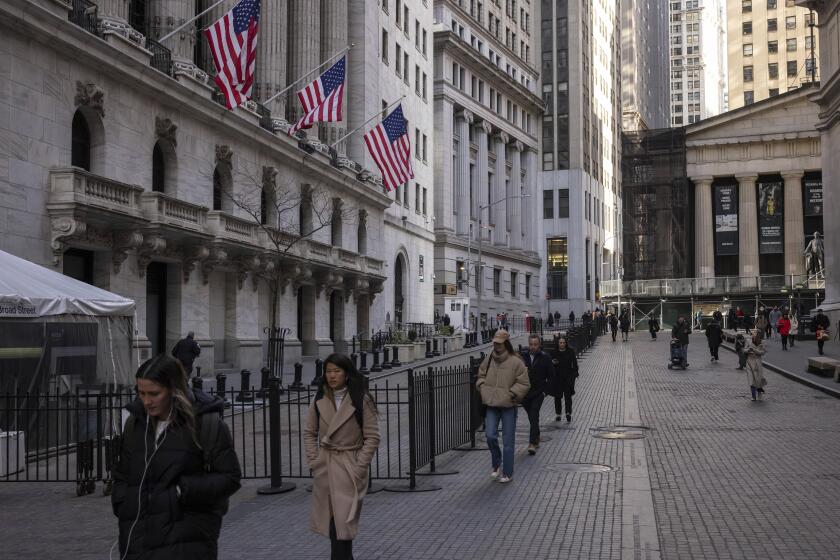401(k) Observers Detect Shift Out of Stock Funds
Facing the biggest market jolt since 401(k) retirement plans became a significant part of many Americans’ investments, a growing number of employee-investors in these plans are beginning to move money out of stock funds.
Although the switching so far involves only a fraction of 401(k) investments, any movement is seen as significant because many 401(k) participants are new to stock investing. The latest market sell-off--in which the Dow Jones industrial average had declined nearly 20% from its July peak through Monday--thus represents their first big market plunge as stock investors.
People tracking 401(k) plans say participants began moving more money in August, switching from stock funds into more stable options, such as money-market funds, so-called stable-value accounts and bond funds. On Monday--when the Dow plunged 6.4%--activity was triple the normal level and, surprisingly, movement out of stocks was especially strong among young people.
“We’re talking about a situation a lot of these investors haven’t experienced before,” said Clark Blackman, national director of investment advisory development for Deloitte & Touche.
Added Joel Disend, president and chief executive officer of New York Life Benefit Services: “These are people who’ve grown accustomed to throwing things against a wall and seeing it all go up.”
Because of inexperience among new investors of all ages, the financial community is watching closely to see how individuals--who’ve plowed $1 trillion into these tax-deferred accounts (more than 60% of that money into stock funds or company stock)--will respond to bad news. There are few constraints on moving these funds, since there are no taxes to pay until withdrawal, and a growing number of plans will make the switches quickly, often at the end of each trading day.
Call volume at Cigna Retirement & Investment Services, the nation’s third largest 401(k) plan sponsor, jumped 80% on Monday. About 40% of those who called actually made a change in their 401(k) plans. Normally, less than 4% of callers actually make a switch.
And of those who switched, 90% moved from equity funds into safer choices.
Even Tuesday, when the Dow rallied after early morning jitters to a 288-point gain, Cigna officials reported heightened trading activity. While some 401(k) investors were attempting to buy back into stock funds on Monday’s dip, about half were still fleeing stocks for less volatile investments.
As significant as this trend is, the amount of money transferred out of stock funds into safer investments still represents less than 1% of all 401(k) account assets, said Monica Gallagher, a spokeswoman for Hewitt Associates, an employee benefits consulting firm that tracks 401(k) activity.
Indeed, the real test of investor behavior may not come for another month, when 401(k) participants begin receiving their quarterly statements, which will likely show the first negative numbers in recent memory.
Brian Bolling, a commercial real estate appraiser, doesn’t have to wait for his quarterly statement to arrive.
“I’m rethinking everything this week,” the 53-year-old Manhattan Beach resident said.
Last year, at the height of the bull market, Bolling took the 20% bond allocation he had in his 401(k) plan and moved it into stocks, making his portfolio completely exposed to equities.
Now that the market has lost 16.1% off its July 17 peak--and now that the company stock he holds in his 401(k) plan has been cut from $27 a share down to $14--he is considering moving a bit of that money back into bonds.
Sentiments like this are becoming more typical, even among younger investors who are thought of as being more aggressive and risk-tolerant.
According to Cigna, 36% of the 401(k) investors who switched out of stock funds into safer options on Friday and Monday were 30 years old or younger. By comparison, only 28% of those who switched were 70 or older; only 20% were between 50 and 60; 9% were 40 to 50; and 7% were 30 to 40 years old.
“At first blush, people who are running for the doors have really been people under 30,” said David Castellani, senior vice president at Cigna.
“The only conclusion I can draw is that these are individuals who have never gone through a bear market,” Castellani said.
Ironically, young 401(k) investors are the last group who should move a great percentage of their 401(k) money out of stock funds, financial planners say.
That’s because in general they won’t need the money for decades. In fact, they would be penalized for taking money out of their company-sponsored retirement plans prior to turning 59 1/2.
Over the long term, financial planners say, investors need to be in stocks, since they represent the only asset class that has provided double-digit annual growth. Since 1926, stocks have delivered, on average, 11% a year, versus 5.7% for long-term corporate bonds and 3.8% for Treasury bills.
Of course, the fact that young investors are moving their 401(k) money may not be a sign of conservatism.
Young investors may be attempting to “time” the market by jumping in and out of funds.
Indeed, according to Cigna officials, a number of 401(k) plan participants were calling to switch money into stock funds in the first hour of trading Tuesday, when the Dow raced out to a 100-point gain. Then, when a sell-off began in the second hour, more calls came in asking to transfer money out of stock funds.
Of course, such market timing efforts don’t work, said Rick Armellini, vice president and branch manager for Fidelity Investments’ Century City investor center. That’s because mutual funds are priced once a day. Whether investors called in the first hour of trading yesterday or in the last, they still sold shares of their fund at the same price.
* ASIA BRACES: U.S. market woes could spell trouble for Asian recovery. D1
MORE COVERAGE: D1, D2, D4






